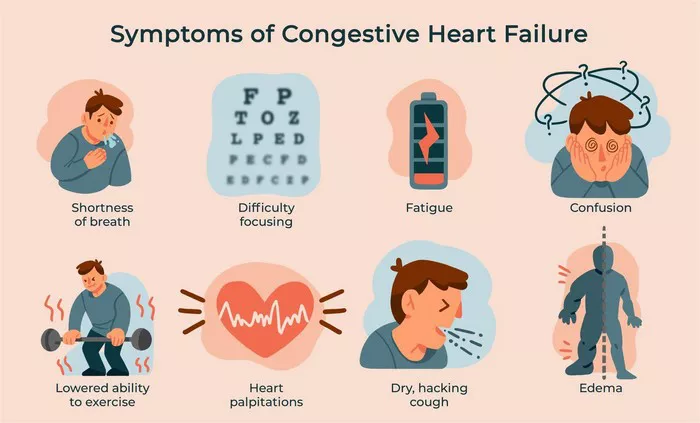Congestive Heart Failure (CHF) is a chronic and progressive condition characterized by the heart’s inability to pump blood effectively to meet the body’s needs. This condition affects millions of people worldwide and is a leading cause of hospitalization and mortality, highlighting the importance of understanding its causes, symptoms, diagnosis, and treatment options.
What is CHF?
CHF occurs when the heart’s pumping function is impaired, leading to a buildup of fluid in the lungs, abdomen, or extremities. This fluid retention contributes to symptoms such as shortness of breath, fatigue, and swelling, impacting a person’s quality of life. CHF can result from various underlying conditions that weaken or damage the heart muscle, including:
1. Coronary Artery Disease (CAD): Atherosclerosis, or the buildup of plaque in the coronary arteries, can reduce blood flow to the heart muscle, leading to heart damage and CHF.
2. Hypertension (High Blood Pressure): Prolonged high blood pressure forces the heart to work harder, eventually weakening its pumping ability.
3. Myocardial Infarction (Heart Attack): A heart attack can cause permanent damage to the heart muscle, affecting its ability to pump effectively.
4. Cardiomyopathy: This condition refers to diseases that directly affect the heart muscle, leading to CHF if the muscle becomes weak or stiff.
5. Valvular Heart Disease: Malfunctioning heart valves can disrupt blood flow and strain the heart, contributing to CHF development.
Symptoms of CHF
Recognizing the signs and symptoms of CHF is crucial for early detection and intervention. Common symptoms include:
1. Shortness of Breath (Dyspnea): Especially during physical activity or when lying flat.
2. Fatigue and Weakness: Due to reduced cardiac output and oxygen delivery to tissues.
3. Swelling (Edema): Typically in the legs, ankles, or abdomen due to fluid retention.
4. Rapid or Irregular Heartbeat (Arrhythmias): Resulting from the heart’s compensatory mechanisms.
5. Persistent Cough: Often accompanied by white or pink-tinged phlegm (sputum) due to fluid buildup in the lungs.
Diagnosis of CHF
Diagnosing CHF involves a comprehensive evaluation of medical history, symptoms, physical examination, and diagnostic tests. Healthcare providers may perform the following assessments:
1. Physical Examination: Checking for signs of fluid retention, such as swelling and lung sounds indicating fluid in the lungs.
2. Blood Tests: Measuring biomarkers like B-type natriuretic peptide (BNP) and troponin to assess heart function and detect heart muscle damage.
3. Imaging Studies: Including chest X-rays, echocardiograms, and cardiac MRI scans to evaluate heart structure, function, and any abnormalities.
4. Electrocardiogram (ECG or EKG): Recording the heart’s electrical activity to detect arrhythmias and assess heart rhythm abnormalities.
Treatment Options for CHF
The management of CHF aims to alleviate symptoms, improve quality of life, and slow disease progression. Treatment strategies may include:
1. Medications: Such as ACE inhibitors, beta-blockers, diuretics, and aldosterone antagonists to reduce fluid buildup, lower blood pressure, and improve heart function.
2. Lifestyle Modifications: Including a heart-healthy diet low in sodium, regular exercise tailored to individual capabilities, smoking cessation, and alcohol moderation.
3. Cardiac Rehabilitation: A structured program combining exercise, education, and support to help patients recover from heart conditions and improve cardiovascular health.
4. Implantable Devices: Such as pacemakers, implantable cardioverter-defibrillators (ICDs), and cardiac resynchronization therapy (CRT) devices to regulate heart rhythm and improve pumping efficiency.
5. Surgical Interventions: In severe cases, heart transplant or ventricular assist devices (VADs) may be considered for patients with advanced heart failure.
Prognosis and Outlook
The prognosis for CHF varies depending on factors such as the underlying cause, disease severity, and response to treatment. With appropriate medical care, lifestyle modifications, and regular monitoring, many patients can effectively manage their symptoms and improve their quality of life. However, advanced cases of CHF may require more intensive interventions and ongoing medical support.
Conclusion
Congestive Heart Failure (CHF) is a complex and challenging condition that requires a multidisciplinary approach for optimal management. By understanding its causes, recognizing early symptoms, obtaining timely diagnosis, and implementing appropriate treatment strategies, healthcare professionals and patients can work together to mitigate the impact of CHF and promote better heart health outcomes.


